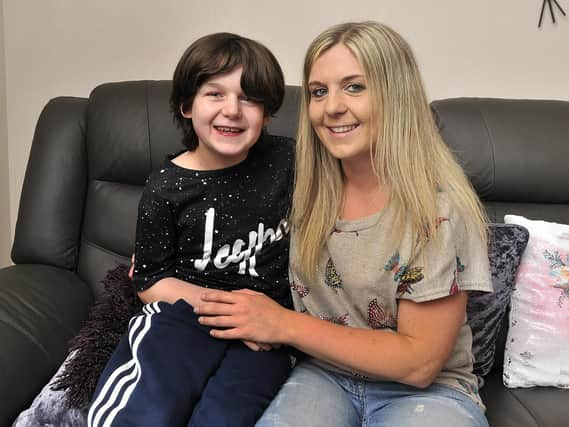Scarborough mum's appeal for life-saving drug


Rhys Mallinson, of Newby, was born with Tuberous Sclerosis Complex (TSC), a condition that leads to growths, which are benign tumours, in various organs.
As a consequence of the condition, the 11-year-old suffers from severe epilepsy, autism and ADHD and he has the mental development of a 12- to 18-month-old.
Advertisement
Hide AdAdvertisement
Hide AdFour years ago, he started taking Everolimus, a drug used to control refractory epilepsy, on a trial basis and since then his quality of life has drastically improved.
Rhys’s mum, Jo Parrott, said: “Over the years Rhys has tried more than 10 epilepsy medications but none have really helped.
“We were out of options and didn’t know what else to do so we were referred to the TS clinic at Alder Hey Children’s Hospital in Liverpool and that’s when he was given Everolimus.
Before he was on the drug he would go to hospital two or three times a week with prolonged seizures. Now, I can’t even remember the last time he was in hospital. He still has seizures every day but they’re not as bad as they used to be.
“This drug has given him the quality of life he never had.”
Advertisement
Hide AdAdvertisement
Hide AdIn March 2018, NHS England consulted on draft guidance which stated that there was “enough evidence” to consider making Everolimus available as an add-on treatment for TSC-related seizures.
However, on Saturday July 7 – just less than a month after the Scottish Medicines Consortium (SMC) recommended Everolimus using the same evidence base as NHS England – a decision was made to not fund the treatment leaving Rhys’s family in shock.
Jo said: “I was devastated, I really thought they were going to make it available. At the moment Rhys is continuing with the trial but I don’t know how long it’ll be going on for.“I dread to think what his life is going to be like if he comes off the drug.”
Maxine Smeaton, chief executive of the Tuberous Sclerosis Association, the only UK charity that supports people affected by the condition, said: “NHS England’s decision to ignore the evidence base and feedback from experts treating and living with TSC is disappointing beyond words. The difference that Everolimus makes to the lives of people with the condition who have refractory epilepsy is unprecedented, and the TS community in England will be devastated by this news.”
Advertisement
Hide AdAdvertisement
Hide AdAn assessment report estimated that the annual cost of providing Everolimus to eligible adults and children living with TSC in England would be just under £60 million.
“I think it’s just about money,” Jo said, “but just think of how much money would be saved if an ambulance didn’t have to take Rhys to hospital three times a week. It’s just a case of deciding what’s cheaper – keep taking him to hospital or give him the drug?”
A spokesperson for NHS England said: “The panel of doctors, clinicians, and the public assessed Everolimus for refractory seizures associated with tuberous sclerosis complex and concluded that it delivered limited benefits compared to other treatments being considered.
“This treatment can be considered again for funding in November but drug companies have an important part to play by pricing their treatments responsibly.”